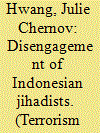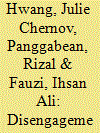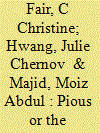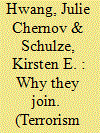|
|
|
Sort Order |
|
|
|
Items / Page
|
|
|
|
|
|
|
| Srl | Item |
| 1 |
ID:
152872


|
|
|
|
|
| Summary/Abstract |
While much research has been conducted on the radicalization of Muslim militants from Jemaah Islamiyah, its spinoffs, and splinter factions; the historical roots of Indonesian radical movements; and their ideological underpinnings, far less analysis has centered on how and why individual militants may come to disengage from violence. Disengagement is defined as a gradual process through which a member of a terror group, radical movement, gang, or cult comes to reject the use of terror methods in pursuit of their goals. Utilizing original fieldwork conducted between 2010 and 2014, with fifty current and former members of Islamist extremist groups in Indonesia, this article will unpack the patterns, pathways, religious considerations, and psychological processes that propel individual militants to turn away from violence.
|
|
|
|
|
|
|
|
|
|
|
|
|
|
|
|
| 2 |
ID:
123219


|
|
|
|
|
| Publication |
2013.
|
| Summary/Abstract |
To what extent are jihadists in Indonesia disengaging from violence? Based on original fieldwork in Jakarta and Central Sulawesi, including interviews with 23 current and former Poso-based jihadists, we examine the emotional, psychological, rational, and relational factors that can lead militants to turn away from terror tactics.
|
|
|
|
|
|
|
|
|
|
|
|
|
|
|
|
| 3 |
ID:
097701


|
|
|
| 4 |
ID:
163206


|
|
|
|
|
| Summary/Abstract |
How do individuals join Islamist extremist groups? Why do individuals support such groups? What factors contribute to a decision to join? What are the pathways into Islamist extremist groups? Drawing on examples from Pakistan, Bangladesh, Indonesia and the Philippines, the articles in this special issue address these critically important questions drawing on original fieldwork, new datasets and large scale national survey research. These articles explore the experiences and perceptions of men and women, South and Southeast Asians, living in majority Muslim and non-Muslim nations. Collectively, they illustrate the importance of social bonds&kinship ties, friendship, teacher-student ties and online relationships in creating a powerful sense of community that fosters a sense of belonging and eventual commitment. The goal of this special issue is to highlight the contributions that Asian cases can make to the often Middle Eastern and European-centric discourses on radicalization, joining and support for militancy.
|
|
|
|
|
|
|
|
|
|
|
|
|
|
|
|
| 5 |
ID:
174770


|
|
|
|
|
| Summary/Abstract |
Indonesia is generally viewed as a moderate Muslim nation that episodically struggles with terrorism. Between 1981 and the end of 2016, Indonesia experienced 156 attacks from some 15 Islamist militant groups. However, the lineaments of popular support for Islamist militancy in Indonesia remain understudied. In this paper, we expand upon the existing literature on popular support for Islamist violence in Indonesia by replicating and extending the empirical framework for modeling the relationship between support for various conceptualizations of Shari’a and support for Islamist violence offered by Fair, Littman and Nugent (2018) for Pakistan and extended to Bangladesh by Fair, Hamza and Heller (2017). To do so, we conduct ordered logistical regression analysis of Pew survey data which includes information about respondents’ religious beliefs and practice as well as support for Islamist violence. We find considerable evidence that their framework is useful for understanding support for violence in Indonesia.
|
|
|
|
|
|
|
|
|
|
|
|
|
|
|
|
| 6 |
ID:
101347


|
|
|
|
|
| Publication |
2010.
|
| Summary/Abstract |
This article examines the extent to which the Malaysian Islamic Party (PAS) and the Prosperous Justice Party (PKS) are becoming more moderate in their strategy and ideology. The author contends that both parties are struggling over the extent to which they should moderate in response both to strategic incentives present in the Malaysian and Indonesian political systems and to the political learning process whereby both parties are coming to understand the preferences of voters in their respective political systems. This process is complicated by divisions in the parties between pragmatists who would postpone controversial goals to reach out to non-devout voters, and purists who prioritize ideological authenticity.
|
|
|
|
|
|
|
|
|
|
|
|
|
|
|
|
| 7 |
ID:
163208


|
|
|
|
|
| Summary/Abstract |
Why do Indonesian Muslims join Islamist extremist groups? This article explores four pathways to entry into Indonesian militant groups: study sessions, local conflict, kinship, and schools. It argues that within all four of these pathways, social bonds and relationships are the common thread in encouraging entry as well as in fostering commitment. Specifically, these relationships contribute to the formation and eventual consolidation of one’s identity as a member of the jihadi group through regular participation in activities, attending meetings, narrowing the circle of friends to those within the group, and participating in increasingly risky and possibly violent activities together. Drawing on original fieldwork including 49 interviews with current and former members of Jemaah Islamiyah, Mujahidin KOMPAK, Darul Islam, Mujahidin Tanah Runtuh, Indonesia’s pro-ISIS network, and other jihadist groups as well as 57 depositions and court documents, this article explores the development and evolution of these pathways and how relational ties play a role in each
|
|
|
|
|
|
|
|
|
|
|
|
|
|
|
|
|
|
|
|
|